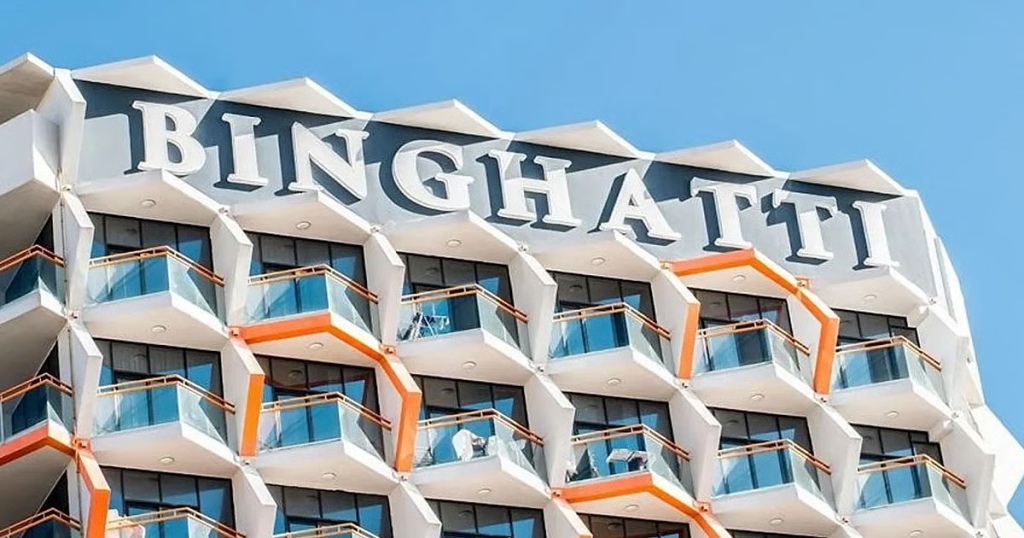
Dubai‐based real‐estate developer Binghatti has publicly denied reports that it had published an IPO prospectus or disclosed a price‑range for a public listing. According to its statement:
In short, an article by Debtwire claimed to have seen a prospectus and a price‑band for an IPO, but Binghatti says that information is unauthorised and misleading.
Why this matters: In markets like Dubai where developer IPOs are watched closely, many investors will make decisions on the assumption that a listing is imminent. Mis‑information on pricing or timing can distort expectations, valuations, and even sentiment across the sector.
The context: Binghatti’s growth story and why an IPO is speculated

To understand why this denial matters, it’s helpful to look at what Binghatti has been doing recently.
Strong financial performance
- Binghatti reported net profit of AED 1.82 billion in H1 2025, more than tripling compared to the same period last year.
- Total sales hit around AED 8.8 billion in that period, while revenue rose ~189% year‑on‑year to ~AED 6.3 billion.
- Its development pipeline is large: over 30 projects, with thousands of residential units in Dubai’s prime locations (Downtown, Business Bay, Jumeirah Village Circle, etc).
- It also recently issued a USD 500 million 5‑year senior unsecured sukuk, which was oversubscribed (orders of ~USD 2.5 bn for USD 500 m issuance) — signalling global investor interest in its credit.
Why an IPO was a natural next step
Given the strong operating metrics and solid growth, it’s no surprise that market watchers speculated whether Binghatti would go public. Indeed:
- A Bloomberg (and related) report noted negotiations with banks such as Citigroup Inc., Morgan Stanley, Emirates NBD and EFG Hermes for a potential IPO.
- Given Dubai’s revival of real‑estate and rising interest from institutional/global capital, a listing of a top developer like Binghatti would likely draw attention.
Thus, the environment was ripe for speculation: strong growth + large pipeline + investor interest = plausible IPO candidate.
What the denial implies — and what to watch
1. Distinction between IPO preparation and formal launch

The fact that Binghatti denies having published a prospectus or price range does not necessarily mean it will never go public — only that the specific document cited does not exist / was not authorised. In capital‑markets jargon, the company may still be exploring or preparing, but has not taken the formal step of filing or publishing. Indeed, previous reporting indicated “in talks” rather than “filed”.
2. Information control & market discipline
By issuing a public denial, Binghatti is signalling: “We will control the timing and content of any announcement.” For investors, this is important: it reduces speculation risk and emphasises that any future IPO will be disclosed via regulated channels (which means the prospectus, price band, etc will be verifiable).
3. Valuation & expectation management
When rumours fly that a prospectus exists with a price range, market participants may start setting expectations (for example, “we expect Binghatti to be valued at X”, “we assume listing at Y per share”). If those rumours are false, and expectations are wrong, it can lead to disappointment or mis‑allocation of capital. The denial helps reset expectations.
4. Timing & conditions remain uncertain
The denial underscores that the timing, size, and terms of any listing are still uncertain. Market conditions, regulatory climate, general economic sentiment, and the developer’s own readiness will all influence when and how a listing might happen. Investors and watchers should treat IPO speculation accordingly: as a possibility not a certainty.
Broader significance: for Dubai’s real estate and capital markets
Real‑estate developers going public
Dubai has seen a growing trend of real‑estate companies tapping capital markets to raise funds, increase transparency, and broaden the investor base. A listing by Binghatti (if/when it happens) would contribute to that dynamic and could help deepen the local equity market.
Corporate governance and disclosure standards
As private companies become public, expectations around governance, audited reporting, liquidity, minority shareholder protections, etc rise. Binghatti’s statement emphasises official channels and controlled disclosures, which is a good sign for market discipline.
Investor sentiment & market confidence
Large capital market events (such as IPOs) often act as signals for investor confidence in the market. If a high‑profile developer lists successfully, it could attract more real‐estate‑equity investors. Conversely, if rumours are frequent and announcements delayed, that could create fatigue or caution. Binghatti’s denial helps maintain credibility.
Aligning with Dubai’s growth story
Dubai continues to position itself as a major global real‑estate and investment hub. Developers such as Binghatti, which emphasise brand partners (luxury brand collaborations), scale, and quality‑design, tie into that narrative. A listing could help showcase that globally. For now, the denial simply means “not yet”.
What investors and watchers should keep an eye on

If you are following Binghatti (or the broader Dubai real‑estate developers sector) for possible investment or strategic opportunities, here are key signals to monitor:
- Regulatory filings / prospectus release: Watch for when Binghatti publishes a formal IPO prospectus (usually via the relevant exchange – e.g., Dubai Financial Market or another venue). That will mark the jump from speculation to concrete.
- Price‑band disclosure & valuation assumptions: Once a price range is disclosed, analysts will start valuing the company based on implied market cap, shares outstanding, growth rates, backlog, etc.
- Investor road‑shows / bank mandates: Which banks are appointed as underwriting / lead managers? What investor feedback emerges? This indicates seriousness of the listing.
- Macro / sectoral environment: Real‑estate markets, interest rates, regulatory reforms, foreign investment flows – all influence developer valuations and listing conditions.
- Operational performance & backlog: Since Binghatti already reports strong H1 numbers, watch H2, full‑year performance, handover volumes, backlog growth, margins. These metrics underpin listing valuation.
- Governance disclosures: As a public company the developer will need to enhance transparency on cap‑table, related‑party transactions, brand partnership terms, project risks, etc.
- Liquidity / free float after listing: The structure offered to public shareholders matters for liquidity and market perception (e.g., sell‐down by founding shareholders, lock‑up periods).
Possible scenarios ahead for Binghatti
- Short‑term listing (12‑18 months): Binghatti may launch an IPO relatively soon if market conditions remain favourable and the company accelerates readiness. The denial simply means “not yet filed or priced”, but preparation may already be underway.
- Medium‑term listing (18‑36 months or more): The company may decide to wait, possibly because valuations still need to improve, or the market needs to digest recent listings from others.
- No listing for now: Binghatti might choose to remain private longer, continuing to fund growth through debt/sukuk, partnerships, and internal cash flows. Indeed, its recent sukuk issuance shows it has access to capital.
Which scenario plays out will depend on internal strategy + external market environment.
Key takeaways

- The denial from Binghatti is significant — it means the prospectus and price range cited in the Debtwire report are not authorised by the company.
- Binghatti remains a high‑profile and fast‑growing real‑estate developer in Dubai with strong performance and a deep pipeline.
- While an IPO remains plausible and perhaps even likely, the timing, structure and valuation remain uncertain and should not be assumed to be imminent.
- For investors/planners, the best approach is to monitor official disclosures, not rely on rumours.
- In the broader sense, the event highlights how Dubai’s real‑estate + capital markets are maturing, with increased attention to transparency, governance and investor communication.
Conclusion:
The story of Binghatti’s denial is a cautionary tale about how rumours and speculation in fast‑moving markets (especially in real‑estate + listings) can generate headlines, but may not reflect reality. The developer’s decision to publicly clarify sets a positive precedent for corporate communication in the region. Whether and when Binghatti proceeds to an IPO remains to be seen — but for now, the prerequisite steps (prospectus publication, pricing range, listing mandate) have not been formally taken. Investors and watchers should keep their focus on the data and official announcements going forward.





Leave a Reply